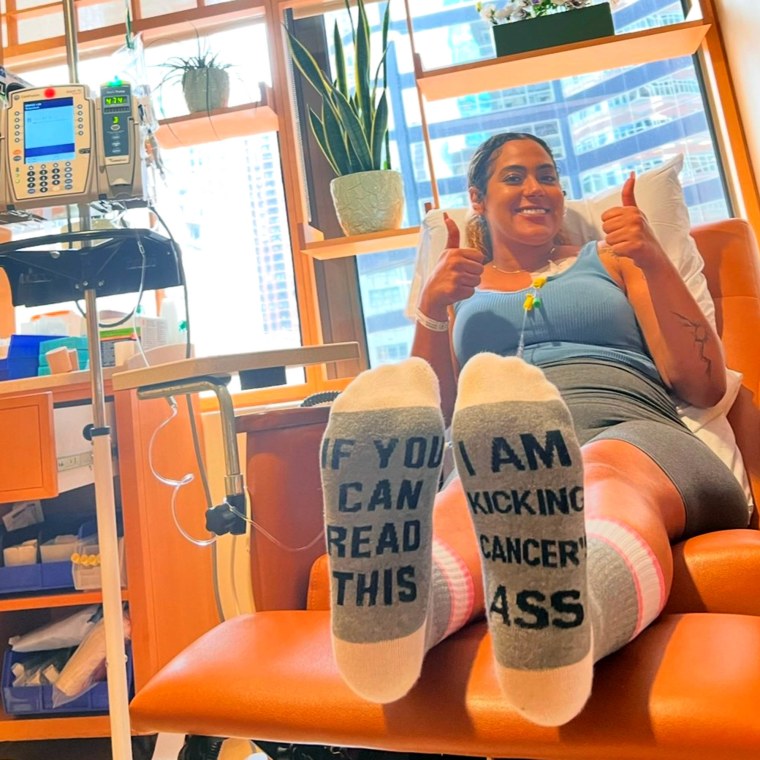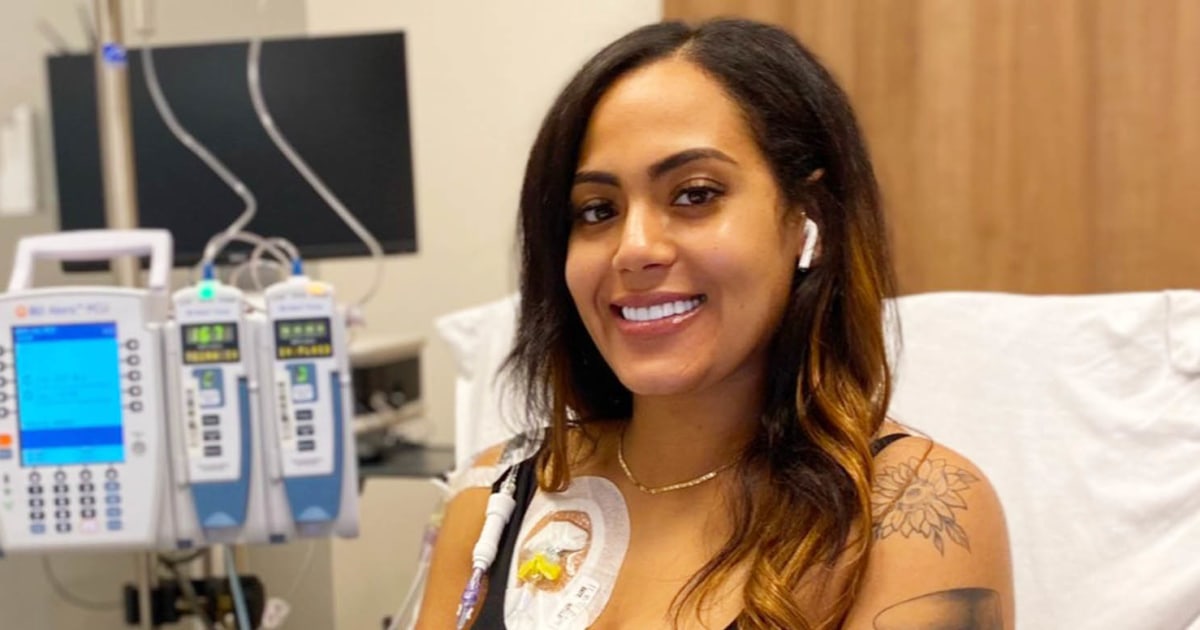Radwah Oda was just 30 when she was diagnosed with colon cancer, an illness that seemed to come out of the blue. But looking back, she’d been experiencing symptoms for about a year without realizing it.
“I was in shock. I didn’t want to believe it. I kept thinking, what did I do wrong?” Oda, who lives in Houston, Texas, tells TODAY.com about being diagnosed in 2021.
“I was really healthy. I worked out four to five days a week. I was eating really healthy, so I never assumed it would happen to me. Each symptom that I had, I just assumed it was something else.”
The single mom blamed irritable bowel syndrome, constipation and even a tight bra. She kept going to the emergency room with what she thought was a stomach virus.
The third time it happened, doctors ordered a CT scan and discovered the tumor. Oda had Stage 4 colon cancer that had spread to her liver.
Colorectal cancer used to be considered an older person’s disease, but it’s now the top cause of cancer death in men under 50 and the second in women in this age group, according to the latest statistics from the American Cancer Society.
Doctors don’t fully know all the reasons early-onset colon cancer is on the rise, but it’s likely lifestyle and environmental factors play a role, says Dr. Daniel Chung, a gastroenterologist at Massachusetts General Hospital and professor at Harvard Medical School.
“It’s not uncommon that people ignore (the warning signs), particularly young individuals, because I think people are thinking that when you’re young, you’re not going to have something like cancer,” Chung tells TODAY.com.
“Being aware of these symptoms is absolutely critical.”
To spread awareness, Oda recently recorded a viral TikTok video listing five colon cancer symptoms she dismissed. Chung, who is not treating Oda but commenting in general, explains why these warning signs can happen:
Narrow stools
Oda noticed what she described as “pencil-thin” stools every time she used the bathroom. She thought it was due to constipation.
Doctors call this symptom a change in stool caliber. One possible reason: When a tumor grows in the lining of the of the colon, the space through which bowel content moves becomes narrower, Chung says.
“It certainly doesn’t automatically mean that it’s cancer because those sorts of things can occur without cancer,” he adds.
“It’s really a matter of if you notice an abrupt change or if you notice something that persists.”
Blood in the stool
Oda assumed it was due to hemorrhoids. She noticed darker colored blood, rather than bright red blood.
When it comes to colon cancer, the color of blood a person sees after a bowel movement depends on where the tumor is located, Chung says.
If it’s very low down in the rectum, the blood is more likely to be bright red. But if it’s further up in the colon, there’s a chance for the color to change a bit and look darker.
“So I wouldn’t say color is necessarily something that you could use as a reliable indicator of whether it’s something to be concerned about or not,” Chung notes. “Any kind of blood would be considered to be abnormal until proven otherwise.”
The appearance of blood is not necessarily associated with pain, he adds. Hemorrhoids are a common reason for rectal bleeding, but there’s no way to know for sure unless a doctor examines you, Chung says.
Bleeding is “probably the red flag symptom we get most concerned about,” he notes.
Never satisfied using the bathroom
Every time Oda had a bowel movement, she felt like she still needed to go more, “like I wasn’t empty, and I would keep pushing and pushing but nothing would come out,” she says.
She once again assumed it was constipation.
This symptom may be due to the combination of the tumor blocking the passage of stool, which makes it more difficult to pass all of it, and the tumor causing the urge to have a bowel movement, Chung says.
The urge to go to the bathroom without being able to defecate is called tenesmus.
Pain on the lower right side
Since the pain was near her right breast, Oda assumed her bra was too tight. It turned out the pain was from the colon cancer metastasizing to her liver, she says.
That’s not a typical symptom related to colon cancer, but if a person notices a new pain, it should be evaluated by a doctor, Chung says.

Chronic fatigue
Oda was always tired and exhausted. She had to nap several times a day regardless of how much sleep she got during the night. No amount of coffee helped.
She also lost 15 pounds, but assumed it was from transitioning from a pescatarian to a vegetarian diet.
Unintentional weight loss is always a concerning symptom and could be associated with different types of cancers, so it’s important to bring it up with your physician, Chung says.
If the tumor has spread, affected the liver or led to anemia from the bleeding, it could contribute to fatigue, he notes.
Diagnosing colon cancer
During an office visit, a doctor may order blood counts to check for anemia, check if you have hemorrhoids and ask about family history of colon cancer.
Oda’s aunt passed away from colon cancer in 1989, the last family history she knows about.
A colonoscopy or sigmoidoscopy can provide important reassurance about whether there is or isn’t something going on, Chung says. Most people should begin screening for colorectal cancer after turning 45, according to the U.S. Preventive Services Task Force.
Oda underwent three surgeries to remove parts of her liver and colon, and received chemotherapy.
For a while, there was no evidence of disease, but more spots have since appeared on her liver. Oda is now taking part in a clinical trial for a new form of chemotherapy, with the hopes it will get rid of the cancer. She is focusing on her 12-year-old daughter, friends and loved ones; traveling and living a normal life.

“Instead of living in fear I just started living in the now, focusing on the good days and surrounding myself with positivity,” Oda says.
“Cancer took over my body and time with doctors and treatment and takes control over a lot of parts of my life, but I will never allow it to take control over my mental health.”


